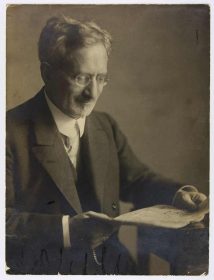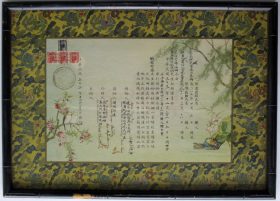The 1930 German Federal Election

Heinz Arzt reading the newspaper, 1920; Jewish Museum Berlin, gift of Hilde Pearton, née Bialostotzky
Recently I was leafing through the inventory listing of a family collection that has been in our archives for many years. I wanted to rework the index in order to bring it up to our current standards. The collection included documents, photographs, and objects from the Arzt and Bialostotzky families. In the twenty-three page inventory, a letter was listed for the Berlin liqueur manufacturer Heinz Arzt (1866–1931) in the category “correspondence,” but neither a sender nor recipient was listed, to say nothing of its contents. The extremely brief description went: “Letter: hand-written, 14 Sept. 1930.”
So I went into the archives and pulled the document numbered 2001/219/28 from box 451 to complete the listing. Suddenly, I was holding a fascinating piece of history in my hands: the so-called letter turned out to be a brief report on the Reichstag election eighty-seven years ago. → continue reading
What makes Rosh ha-Shanah special
The Jewish year 5778 begins today—and with it a very special time for the Jewish community worldwide. Rosh ha-Shanah is the beginning of the High Holy Days, the Yamim Noraim (literally “Days of Awe”) as they’re known in Hebrew.
I asked around my friend group a bit to find out what Rosh ha-Shanah means to them personally: → continue reading
– How Jewish Memory Objects Preserve Chinese History

Chinese marriage certificate for Irma Bielschowsky (1902–2000) and Albert Elias Less (1887–1952), 1944; Jewish Museum Berlin, gift of Gert and Brigitte Stroetzel
I recently shared my view on several objects from Shanghai in the museum’s collection on this blog. Now, I want to draw your attention to a few marriage certificates that caught my eye not just because of their elegant design and well-preserved condition after more than 70 years, but also because I was amazed how Chinese cultural elements had entered and influenced the life of Jews who fled the Nazi rule, even though the Jews largely maintained their own cultural and educational activities in Shanghai with newspapers, Jewish schools, concerts, sport activities, theaters (e.g. Delila, Nathan der Weise, etc.), and parties (e.g. a not so sober celebration of Purim). → continue reading

